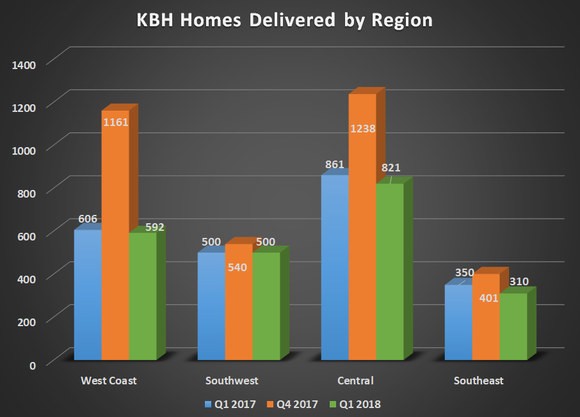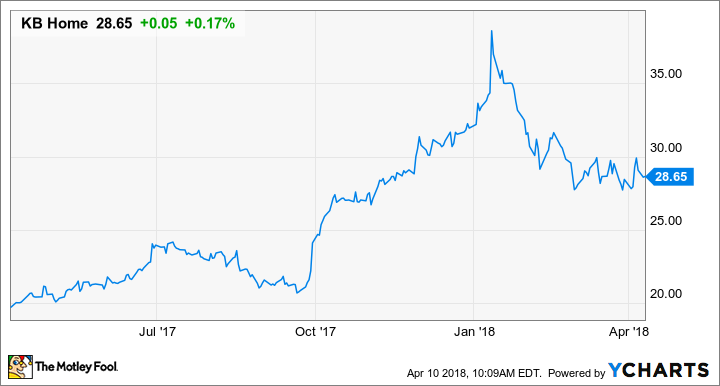KB Home's Earnings Slide on One-Time Charges
When it comes to homebuilder KB Home (NYSE: KBH), management has put forth two metrics to watch in the future: debt levels and rates of return. At the end of 2017, it had put the business within the debt range, but returns had not yet followed.
This past quarter, we saw a bit of a retreat as debt both increased and earnings remained rather muted. Let's take a look at KB Home's most recent results and what investors should be on the lookout for throughout the rest of 2018.

Image source: Getty Images.
By the numbers
Metric | Q1 2018 | Q4 2017 | Q1 2017 |
|---|---|---|---|
Revenue | $871 million | $1.4 billion | $818 million |
Homebuilding operating income | $44.1 million | $131.8 million | $19.9 million |
Net income | ($71.2 million) | $84.3 million | $14.2 million |
Earnings per share (diluted) | ($0.82) | $0.84 | $0.15 |
DATA SOURCE: KB HOME EARNINGS RELEASE.
If you remember last quarter, many companies reported huge one-time charges or credits related to changes in their respective tax obligations. Since KB Home's earnings schedule is slightly different than that of others (the end of its quarters come at the end of February, May, August, and November), those tax changes had not yet been enacted when it reported.
So this quarter it was KB Home's turn. Because of those tax changes, the company posted a one-time charge of $111 million to adjust the value of some deferred tax assets (a loss in prior quarters a company can use against taxes in future years). Adjusting for these one-time charges, KB's first-quarter numbers were right in line with the prior quarters' per-share result of $0.15.
From an operations standpoint, though, the company performed slightly better on a year-over-year basis. New home deliveries were flat and the total community count (those housing developments with homes left for sale) declined. However, the average selling price per home continued to rise (up 7%) and net new orders both increased compared to last year and was more than homes delivered despite the smaller community count.

Data source: KB Home earnings release. Chart by author.
What was a little peculiar was a slight uptick in the company's debt levels. Management has said that it wants to maintain net debt to capital in the 40% to 50% range, which it comfortably achieved in the prior quarter. This most recent quarter, however, less cash on hand and a modest uptick in notes outstanding left it with a net debt-to-capital ratio of 49.3%. This uptick certainly isn't something worth writing home about yet since the company is investing in new communities, but it's something to at least keep track of in upcoming quarters.
What management had to say
If KB Home's management has any trepidation about rising interest rates, CEO Jeffrey Mezger certainly didn't show it in his prepared remarks. Based on his statement outlining the company's plan for the year and beyond, the housing market should be humming along just fine for some time.
For the remainder of 2018, we plan to continue to execute on our Returns-Focused Growth Plan, and expect to benefit from favorable housing market dynamics. In particular, we believe our long history of primarily serving first-time homebuyers, along with offering products designed to meet their needs, will enable us to continue to successfully attract millennials, which currently represent the nation's largest and fastest growing demand segment. Moreover, we anticipate our housing gross profit margin will continue to strengthen throughout the year as we deliver more homes from newer, higher-margin communities, realize additional improvements from our community-specific action plans, and generate greater operating leverage. With good sales momentum across our business, and a considerable number of planned new openings on the horizon, we believe we are on track to end 2018 with a slightly higher community count and are well positioned operationally and strategically for the opportunities ahead.
(Check out the company's entire conference call transcript here)
It's no surprise that Mezger highlighted the millennial demographic. Just about every other homebuilder has mentioned something recently about targeting this age cohort as many enter the housing market. Millennials represent the largest age group outside the baby boomers, and many have put off home purchases for a while (a hangover from the recession). All of this pent-up demand for housing should help to offset any great concerns about rising interest rates for a while.
What a Fool believes
With KB Home's balance sheet now within its target range and management's proclamations that it is focused on returns, it's a little strange that all this growth lately hasn't translated into a dividend hike -- its payout has remained constant since 2013. Perhaps later this year we will see some value enhancing initiatives once it gets through this heavy investment phase.
KB Home, like so many other homebuilders, have a lot of wind at their backs right now, and there are few signs that things are going to turn for the worse anytime soon. With a huge customer base -- i.e., millennials -- lining up for their first new purchase, demand for homes is likely going to remain high for a while. That robust demand helps to cover up some of KB Home's blemishes like its debt levels and historically low rates of return. For those looking at a long-term investment, KB Home still has some work to do in terms of improving its balance sheet and showing that it can consistently deliver shareholder value.
More From The Motley Fool
Tyler Crowe has no position in any of the stocks mentioned. The Motley Fool has no position in any of the stocks mentioned. The Motley Fool has a disclosure policy.

 Yahoo Finance
Yahoo Finance 
